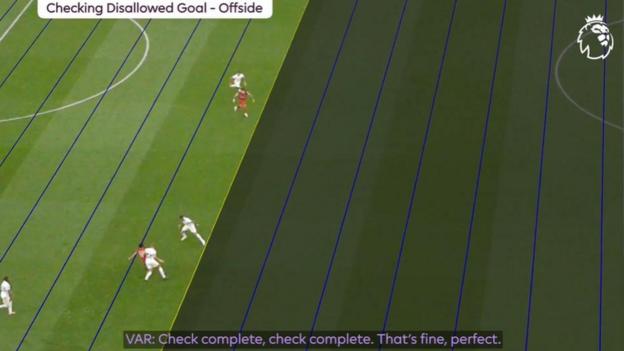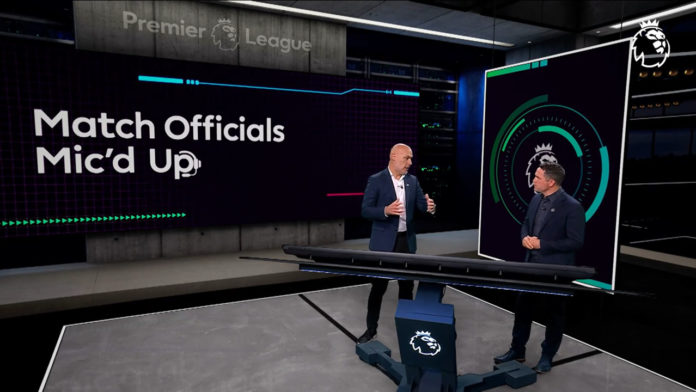Referees’ chief Howard Webb says steps have been taken to avoid a repeat of the controversy surrounding Luis Diaz’s disallowed goal for Liverpool against Tottenham.
Video assistant referee (VAR) Darren England did not overrule when Diaz was wrongly flagged offside last month.
Liverpool lost the game 2-1.
“We’ve put quite a lot of steps in place to ensure the error that we saw doesn’t happen again,” Webb told Match Officials: Mic’d Up.
In audio recordings of discussions between the match officials made public by referees’ body the Professional Game Match Officials Limited (PGMOL), England says the check is “perfect” before swearing when he realises a mistake has been made.
Webb said VAR had “fallen short” on this occasion and the PGMOL needed to act, with new VAR communication guidelines being applied since then.
“One of things this brought into sharp focus is the need to reiterate some of those communication protocols which are really valuable in VAR to prevent this type of thing happening,” added Webb on Sky Sports and TNT Sports.
“We got all of the officials together, we spoke through the need to go through that process very diligently.
“We’re really disappointed for the game, we’re disappointed for our reputation.
“We worked hard over the subsequent days to have a look at what we needed to do to put in place those safeguards around the communication to avoid that sort of thing happening again.”
Webb said small changes to VAR could be made by the International Football Association Board (Ifab) – the body that determines the laws of the game – in the near future.
“I know that Ifab, in fact before this situation even happened, I knew that they were going to do a full review of the laws of the game relating to the use of VAR,” he added.
https://emp.bbc.com/emp/SMPj/2.50.8/iframe.htmlMonday Night Club: Rory Smith says VAR is ‘a real problem’ that needs to be reviewed
Tottenham 2-1 Liverpool – VAR incorrectly disallows goal (30 September)
What happened?
The match was goalless – with Liverpool down to 10 men after Curtis Jones’ red card for a tackle on Yves Bissouma – when Diaz thought he had put the visitors ahead after 34 minutes.
But the flag was immediately raised for a possible offside against the Colombian before he ran to a collect a pass from team-mate Mohamed Salah.
Replays confirmed Diaz was actually onside and the goal should have stood.
The VAR team – England, his assistant Dan Cook and the replay operator – evaluated the replays, starting with Diaz collecting the ball and the moment which it is released by Salah.
Moments later England told on-field referee Simon Hooper the check was complete – which means he indicated the offside call was correct and the match could be restarted with a Spurs free-kick.
Hooper restarted the game after indicating to the players that Diaz was ruled offside by the VAR.
The realisation that this was a mistake dawned on the VAR team.
The replay operator alerted England that Diaz was flagged offside, meaning that the check was to see if he was onside, and assistant VAR Cook confirmed they had made the wrong decision.
As England realised an error had been made, Liverpool were on the attack through left-back Andy Robertson and Diaz.
The ball was cleared into touch and play stopped before a Liverpool throw-in.
At this point Oli Kohout – the VAR Hub operations manager, who was in a different room to the VAR team – communicated the game should be delayed in a bid to rectify the decision.
However, the team realised they were not allowed to do that under the laws of the game relating to VAR – one of the areas Webb suggested Ifab may look at.
“They considered whether or not they could intervene to stop the game. But they recognised that the laws of the game as set by Fifa and the International Football Advisory Board doesn’t allow that,” Webb said.
“That’s a process in place that sits in the laws of the game about how we use VAR to make sure it’s delivered consistently throughout every league on the world, and it doesn’t allow you to go back in those circumstances and as such they decided not to intervene.”
What are the changes?
“We took the unusual step of releasing the audio from this situation not long after it happened,” Webb said.
“We wanted to show everybody what was quickly apparent to us was a pretty significant human error – loss of concentration.
“One of the things that we have to do is put things in place to ensure that should we have human error, it doesn’t have the damaging impact that we saw on this occasion.
“We want the on-field referee to communicate to the VAR what the on-field decision is, very clearly. Then the VAR to go back to the on-field referee and acknowledge that they’ve heard that properly.
“The VAR goes through the process then of checking the situation giving clear direction to the replay operator to get the right angles, speaking to that assistant VAR as they go through that as well, so the assistant VAR can be another check and balance, before communicating to the field, speaking to the AVAR [assistant VAR] to say what their intended direction of travel is going to be.
“Then, at that moment, not just saying ‘check complete, check complete’ because what are you check completing?”
‘He was extremely fortunate to stay on the pitch’
Webb also looked at a challenge by Manchester City midfielder Mateo Kovacic in Sunday’s Premier League match at Arsenal.
The Croatian – already on a booking – fouled Arsenal captain Martin Odegaard, but was not shown a second yellow card by referee Michael Oliver.
“Obviously the VAR can’t get involved, second yellows are something that the VAR is not able to get involved in,” Webb said.
“But I think he was an extremely fortunate player to stay on the field of play.
“The referee – one of our best referees, one of the best referees in the world – Michael Oliver, will no doubt review that.”
A clip of a penalty being awarded to Luton against Wolves – and subsequently upheld by VAR – was also discussed.
Wolves midfielder Joao Gomes handled in the box when the ball caught his arm which was above his head, but only after it had deflected off his boot.
The decision was upheld by the VAR team and Webb explained the “unnatural position” of the player’s arm had “trumped” the fact it came off his boot, as far as the officials were concerned.
“I have some sympathy with the player,” Webb said. “But don’t forget the onfield decision was penalty.”


